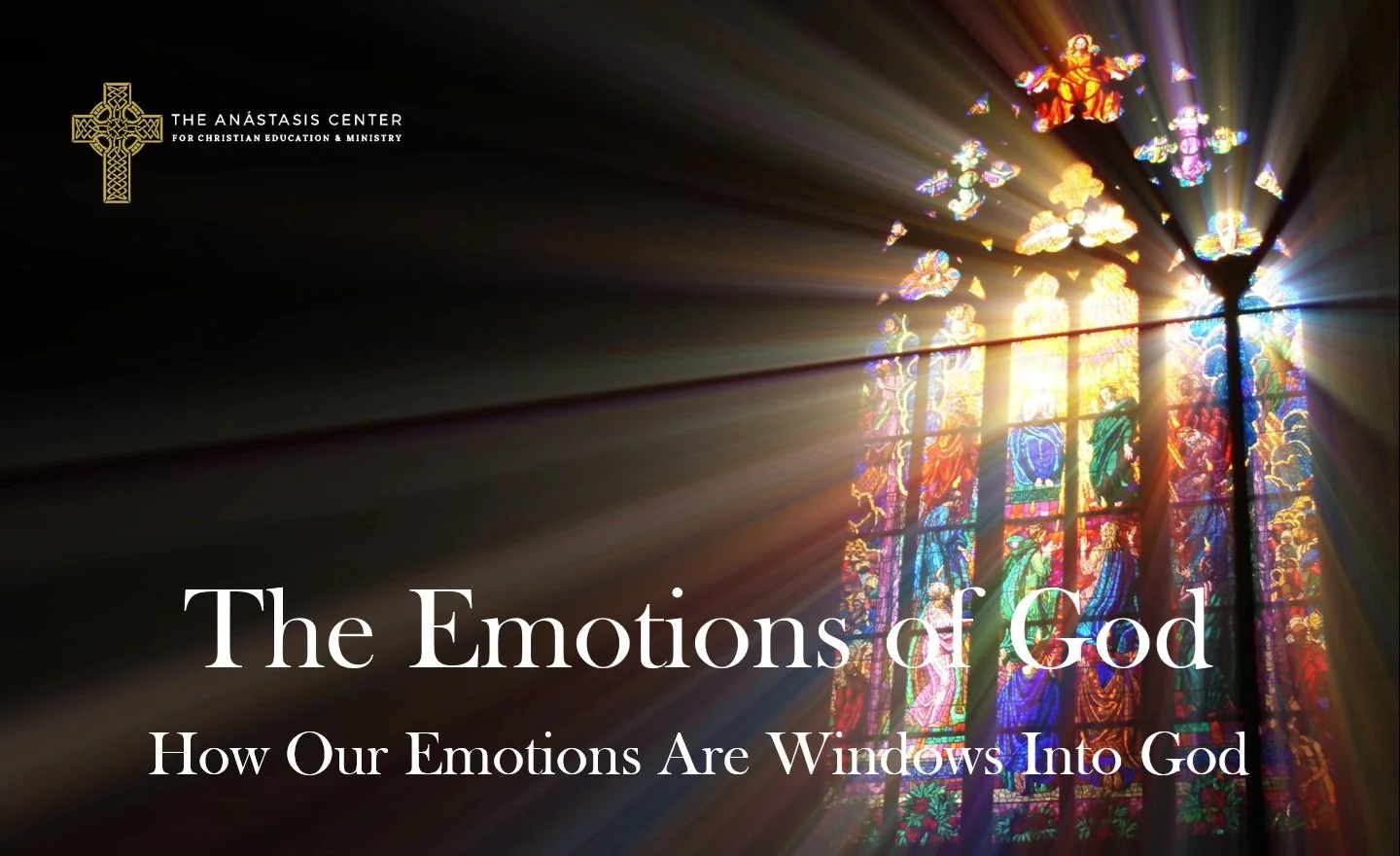Photo credit: Stock Photos for Free | Flickr.
God Has Emotions? So What?
Children learn to regulate their emotions by being attached to someone who is emotionally regulated. Jesus was and is securely attached to his Father by the Spirit, and offers us the securest attachment to himself. That is why Jesus’ human emotions are meant to shape, empower, and regulate our emotions.
Jesus demonstrated very human emotions and called forth our participation in God’s joy, sorrow, etc. These passages give us valuable insights into God’s character and love for us.
The Emotions of God is a curriculum for small group discussion. It is a subset of the Shame and Glory material. Scripture often invites us to consider emotional language as it applies to God. This video clip is from our 2019 Conference: Healing Atonement.
In this interview by Spencer Owen, Mako narrates his own personal journey, how his search in the New Testament for how Jesus and the apostles motivated Christians led him to leave behind “penal substitutionary atonement” and teach “union with Christ” instead. “We take a look at shame and how it affects our relationship to God; we explore the true nature of justice in the Scriptures (retributive or restorative?); we discuss how empathy has been belittled and derided in our culture, and what this does to the Church. In the end, we dive deep into where our own emotions come from, if we can trust them (or not), and what they tell us about both our own nature and the nature of the Father -- who also has emotions, and who has entered into our own emotions to be able to heal those expressions of his image in us.”
Small Group Leader Discussion Guide
1. The Longing and Joy of God for the Lost, Part 1: Luke 15:1 - 10
2. The Longing and Joy of God for the Lost, Part 2: Luke 15:11 - 32
3. The Angry Tears of Jesus: Is This the Wrath of God?: John 11:20 - 44
4. What Jesus Lusted For: Luke 22:14 - 23
5. The Zeal of Jesus: John 2:13 - 25
6. The Gut-Turning Compassion of God: Luke 10:25 - 37; Matthew 9:36; 14:14; 15:32; 20:34
7. The Eagerness of God to Help Us: Luke 11:1 - 13
8. The Lament of Jesus: Luke 13:31 - 35
9. The Affections of Jesus: Philippians 1:8
10. The Grieving of God: Ephesians 4:29 - 32
11. The Jealousy of God: Exodus 20:1 - 6; Deuteronomy 4:1 - 24
12. Sharing in the Pleasure of the Father in the Son, Part 1: Matthew 3:13 - 4:11; John 8:28 - 29
13. Sharing in the Pleasure of the Father in the Son, Part 2: Matthew 17:1 - 13; Exodus 34:29 - 35
14. Beholding the Face of God: Numbers 6:22 - 27; Luke 15:20 - 24; John 14:8 - 11
More Resources on The Emotions of God
-
Top Resources, Biblical
Terence Fretheim, The Suffering of God: An Old Testament Perspective. Fortress Press | Amazon page, 1984. Brilliant and sensitive analysis of the Old Testament anthropomorphistic and anthropopathic language as leading up to Jesus’ own humanity and emotionality as God incarnate.
Paul Gavrilyuk, The Suffering of the Impassible God: The Dialectics of Patristic Thought. Oxford University Press | Amazon page, 2006. Probably the benchmark in the field of understanding the suffering of God, and how to speak of the emotions of God. Gavrilyuk covers the Greek Septuagint’s translational decisions to blunt the anthropomorphic and anthropopathic language for God, and how that affected the Greek patristic writers. An important complement to Terence Fretheim, above, although I prefer Fretheim’s approach.
Rob Lister, God is Impassible and Impassioned: Toward a Theology of Divine Emotion. Crossway | Amazon page, 2013. Lister argues that God is fundamentally impassible and unchanging in love, and deeply impassioned towards His creation because of His love.
Top Resources, Patristic
Post-Apostolic Church, Early Christianity On: The Emotions of God the Father. Post-Apostolic Church, Jun 29, 2019. A video which gives an excellent introduction to the two main views in early Christian writers: God’s emotions are figurative language for God’s activity and intentions towards us, and God’s emotions as real but not evil. By comparison, some schools of Greek thought made rationality good and emotionality evil.
Top Resources, Pastoral
Soren Johnson, 2018 and the Gift of Tears. The Arlington Catholic Herald, Dec 27, 2017. Johnson cites Jesus’ statement, “Blessed are those who mourn” and Paul’s admonition, “Weep with those who weep” as anchor points, and Ephrem the Syrian as illustrative, with grieving over 2018. See also Frederic and Mary Ann Brussat, The Gift of Tears. Spirituality and Practice. The Brussats cite early Christians and Jewish reflection on tears. Deacon Tom, The Gift of Tears. Catholic Mom, Jul 10, 2009. Deacon Tom, More on the Gift of Tears. Catholic Mom, Oct 20, 2012. Deacon Tom draws on insights from Teresa of Avila. Jeannie Ewing, Demystifying the Gift of Tears. Integrated Catholic Life, Aug 10, 2016. Ewing gives helpful thoughts on discernment. Cindy Wooden, Theology of Tears: For Pope, Weeping Helps One See Jesus. Catholic News Service, May 5, 2016. Wooden draws heavily on Pope Francis’ comments and actions.
-
Athanasius of Alexandria, Against the Heathen on the corruption and healing of our desires; a pdf copy of select quotations from Against the Heathen / Contra Gentes.
Athanasius of Alexandria, Discourses Against the Arians 3 discusses Jesus healing human desires from within our humanity, as a human being; see paragraphs 31 - 41 and 54 - 55.
Ambrose of Milan, On the Holy Spirit book 1, paragraph 66 discusses Jesus setting free our affections, though with no further explanation
Ambrose of Milan, Exposition of the Christian Faith book 5, paragraph 53 says, “Many things therefore we read and believe, in the light of the sacrament of the Incarnation. But even in the very feelings of our human nature we may behold the Divine Majesty”
Evagrius Ponticus, On Thoughts. Independent publisher | Amazon page, Aug 2024.
“Evagrius Ponticus' "On Thoughts" is a profound spiritual treatise offering deep insights into the complex inner life of a Christian ascetic. The text explores the nature of various thoughts—both virtuous and demonic—and their influence on the soul's journey toward purity and communion with God. Evagrius delves into the subtle ways in which evil thoughts can hinder spiritual progress, even when cloaked in the guise of virtue. He emphasizes the importance of vigilance, prayer, and discernment in overcoming these thoughts and attaining a state of dispassion. The work also addresses the challenges of excessive asceticism, the role of dreams in spiritual life, and the struggle to maintain pure prayer. Evagrius offers practical guidance for monks and hermits striving to achieve a life of virtue, inner peace, and a closer relationship with God.”
Evagrius Ponticus, On the Eight Evil Spirits. Amazon page, Sep 2024.
“This work is a deeply reflective exploration of the spiritual life, focusing on the eight passions that hinder one's path to holiness. It offers timeless wisdom on battling gluttony, lust, greed, anger, despondency, and pride, while extolling the virtues of humility, patience, and self-discipline. Through vivid metaphors and practical teachings, the text provides a roadmap for overcoming inner temptations and achieving spiritual clarity. Both profound and accessible, it is a valuable guide for those seeking to deepen their understanding of asceticism and cultivate a life of virtue and contemplation.”
See also Dallas Wolf, Evagrius Ponticus: “The Eight Evil Thoughts (Logísmoi)”. First Thoughts of God blog, Oct 20, 2017. An excellent short article that can serve as an introduction.
George Tsakiridis, Evagrius Ponticus and Cognitive Science: A Look at Moral Evil and the Thoughts. Pickwick Publications | Amazon page, Jan 2010.
“This study puts the thought of Evagrius Ponticus, a fourth-century theologian, into dialogue with modern cognitive science in regard to the topic of evil, specifically moral evil. Evagrius, in his writings about prayer and the ascetic life, addressed the struggle with personal moral evil in terms of the eight "thoughts" or "demons." These "thoughts" were transmitted by John Cassian to the Western church, and later recast by Gregory the Great as the Seven Deadly Sins. Though present understandings of evil appear to differ greatly from those of Evagrius, his wisdom concerning the battle against evil may prove to be of great help even today. Using the work of Pierre Hadot to recover Evagrius' context, and the work of Paul Ricoeur to discuss how we construct descriptions and myths of evil, Evagrius is brought into dialogue with the cognitive sciences. Using current research, especially the work of Eugene d'Aquili and Andrew Newberg, this study reveals the contemporary relevance of Evagrius' approach to combating evil. In addition, the interdisciplinary study of patristics and cognitive science opens the pathway to a better understanding between Christian tradition and the modern sciences.”
Simo Knuuttila, Emotions in Ancient and Medieval Philosophy. Clarendon Press | Amazon page, Sep 2004. Chapter 2 is called Emotions and the Ancient Pursuit of Christian Perfection:
“Early Christian theories of the emotions were influenced by the Platonic psychology and control oriented therapy as well as by the Stoic theory and therapy. Particularly important were the Stoic doctrine of spontaneous first movements and the ideal of apatheia which the Christian authors qualified by the conception of love. Section 1 deals with the views of emotion, sin, progress, and spiritual experience in Clement and Origen, who were the main representatives of early Alexandrian theology. Sections 2 and 3 deal with the partial reception and modification of this approach by the Cappadocian theologians and the Egyptian desert monks, whose teaching came to influence Western thought through the works of John Cassian. Augustine's view of the emotions and the will is discussed in Sect. 4. Section 5 deals with the ideas of Gregory the Great, Pseudo‐Dionysius, and some other late ancient authors.”
Susanna Elm, "Virgins of God": The Making of Asceticism in Late Antiquity. Clarendon Press | Amazon page, Feb 1996. Mentions that Christians withdrew to the desert partly in response to the pressures and traumas of the violence of the Greco-Roman cities.
“Many of the institutions fundamental to the role of men and women in today's society have their origins in late antiquity. This revisionist study offers a comprehensive look at how Christian women of this time initiated alternative, ascetic ways of living, both with and without men. The author studies how these practices were institutionalized, and why they were later either eliminated or transformed by a new Christian Roman elite of men now thought of as the founding fathers.”
Peter Brown, The Body and Society: Men, Women, and Sexual Renunciation in Early Christianity. Columbia University Press | Amazon page, Jul 2008. Brown touches on physical and sexual danger as one of the reasons why Christians withdrew from cities and developed communities elsewhere, probably in part to process the trauma.
“First published in 1988, Peter Brown's The Body and Society was a groundbreaking study of the marriage and sexual practices of early Christians in the ancient Mediterranean and Near East. Brown focuses on the practice of permanent sexual renunciation-continence, celibacy, and lifelong virginity-in Christian circles from the first to the fifth centuries A.D. and traces early Christians' preoccupations with sexuality and the body in the work of the period's great writers. The Body and Society questions how theological views on sexuality and the human body both mirrored and shaped relationships between men and women, Roman aristocracy and slaves, and the married and the celibate. Brown discusses Tertullian, Valentinus, Clement of Alexandria, Origen, Constantine, the Desert Fathers, Jerome, Ambrose, and Augustine, among others, and considers asceticism and society in the Eastern Empire, martyrdom and prophecy, gnostic spiritual guidance, promiscuity among the men and women of the church, monks and marriage in Egypt, the ascetic life of women in fourth-century Jerusalem, and the body and society in the early Middle Ages. In his new introduction, Brown reflects on his work's reception in the scholarly community.”
Lactantius, On the Anger of God. Lactantius discusses emotions of God as not simply metaphorical language, see especially chapters 15 - 16
John Chrysostom, Homily 2 on Philippians. John Chrysostom discusses the "tender mercies" or "affections" of Christ Jesus shared with us. See also John Sanidopolous, Divine Eros by John Chrysostom. blog, Apr 1, 2014)
John Chrysostom, Homily 13 on Romans. John Chrysostom attributes desires to the body, and rationality to the soul. This can be critiqued as an oversimplification, but the important point here is that desire is original, the disorder of desire is the result of the fall and our choice.
“for when the body had become mortal, it was henceforth a necessary thing for it to receive concupiscence, and anger and pain, and all the other passions, which required a great deal of wisdom to prevent their flooding us, and sinking reason in the depths of sin. For in themselves they were not sin, but when their extravagance was unbridled, it had this effect. So... desire is not sin... Paul... is not finding fault with the body, but pointing out the soul’s superiority. For the whole duty of pilotage has been put into its hands... Paul here points out, giving the governing power to the soul.”
Cyril of Alexandria, Commentary on John's Gospel on desires and Jesus' redemption of human desire. See Andrew Mellas, “The Passions of His Flesh”: St. Cyril of Alexandria and the Emotions of the Logos. Phronema | Academia.edu, 2014. Mellas does an excellent job explaining Cyril’s commentary and examination of Jesus’ emotions.
John Cassian, Conferences on desires and free will
Peter Brown, Augustine of Hippo: A Biography. University of California Press | Amazon page, 2000. Brown includes very good quotes from Augustine on desires, which are excerpted here.
Jennifer Hevelone-Harper, Disciples of the Desert: Monks, Laity, and Spiritual Authority in Sixth-Century Gaza. Johns Hopkins University Press, Jul 2005.
“On the periphery of the Roman empire, the sixth-century desert city of Gaza served as a crossroads between Palestine and Egypt. The nearby village of Tawatha was home to the thriving monastery of Abbot Seridos and the renowned anchorites Barsanuphius, known to the people as the Great Old Man, and his disciple John. The laity of the area looked to the monks for spiritual leadership, as did their brother monks, bishops, and religious leaders from as far away as Jerusalem and Constantinople. Having adopted a life of physical isolation, the monks communicated with others by letters, offering guidance in such matters as treatment of slaves, distribution of alms, interpretation of visions, and social relations with pagans and Jews.
This extraordinary correspondence opens a window into the spiritual world of the desert monastery and the lay community it served. In Disciples of the Desert, Jennifer Hevelone-Harper uses a careful study of the letters to reveal fascinating insights into the monastic community and sixth-century Christian spirituality.
Hevelone-Harper explains the network of spiritual authority that was created to lead the monastic community and discusses how monastic leaders responded to challenges to authority, appointed successors, and chose and mentored disciples. She reveals the immense love that Abbot Seridos, Barsanuphius, and John had for their fellow monastics and for the lay community in Tawatha, Gaza, and beyond.”
Paul Blowers, Gentiles of the Soul: Maximus the Confessor on the Substructure and Transformation of Human Passions. Journal of Early Christian Studies, Spr 1996. Blowers discusses passions, desires, and free will in the thought of Maximus the Confessor, the church’s leading theologian in the 6th century.
Paul Blowers, The Dialectics and Therapeutics of Desire in Maximus the Confessor. Vigilae Christianae, 2011. Studies Maximus the Confessor's Ambiguum 7 as both a critique of Origen’s cosmology and teleology, using Gregory of Nazianzus’ Oration 14 about life in the body, with special attention given to human desire. Human desire and emotion is integral to human volition and freedom - and central to our partnership with God on the road to deification. Maximus also engages with Gregory of Nyssa to develop “a sophisticated dialectics and therapeutics of desire that integrates important perspectives of the Confessor's anthropology, christology, eschatology, and asceticism.”
Hierotheos Vlachos, Pleasure and Pain by Maximus the Confessor. Orthognosia blog, Dec 2014. But sexual pleasure is fundamentally negative? Vlachos serves as evidence that Christianity departed too far from Judaism.
Martin Hinterberger, "Emotions in Byzantium," edited by Liz James, A Companion to Byzantium. Wiley-Blackwell | Amazon page, 2010. Hinterberger is a sensitive reader of patristic and Byzantine writings. While Byzantine Christian interpretations of emotions tended to be pragmatically framed in the negative. e.g. anger, sloth, lust, etc., the positive virtues were assumed. Hence, we can discern that the now-controversial Greek term apatheia was not used to mean indifferent, or unfeeling. It referred to how decision-making was to be driven by virtues and not the passions – ta pathe. – i.e. the pathological emotions.
Andrew Mellas, Liturgy and the Emotions in Byzantium: Compunction and Hymnody. Cambridge University Press | Amazon page, Jul 2020.
“This book explores the liturgical experience of emotions in Byzantium through the hymns of Romanos the Melodist, Andrew of Crete and Kassia. It reimagines the performance of their hymns during Great Lent and Holy Week in Constantinople. In doing so, it understands compunction as a liturgical emotion, intertwined with paradisal nostalgia, a desire for repentance and a wellspring of tears. For the faithful, liturgical emotions were embodied experiences that were enacted through sacred song and mystagogy. The three hymnographers chosen for this study span a period of nearly four centuries and had an important connection to Constantinople, which forms the topographical and liturgical nexus of the study. Their work also covers three distinct genres of hymnography: kontakion, kanon and sticheron idiomelon. Through these lenses of period, place and genre this study examines the affective performativity hymns and the Byzantine experience of compunction.”
John W. O'Malley, The First Jesuits. Harvard University Press | Amazon page, Jan 1995.
Petre Maican, The Asceticism of Emotions: An Eastern Orthodox Approach to Inclusion. Palgrave Macmillan, Mar 2025. Petre Maican (PhD University of Aberdeen) is Associate Researcher at The Institute for Eastern Christian Studies of Radboud University (The Netherlands). His current research interests lie at the crossroads between theological anthropology, intellectual disability, and Eastern Orthodox spirituality.
“This book delves into the profound challenges posed by the negative emotions―fear, pity, and disgust―that persons with atypical bodies often evoke in their non-disabled peers. It seeks to uncover the theological roots of these reactions and offers a transformative path for overcoming them. Drawing deeply from the ascetical tradition of the Eastern Orthodox Church, the book highlights centuries of rich insights into the dynamics of emotions and their spiritual transformation. By engaging with this tradition, the book provides a nuanced understanding of how emotions shape human perception and interaction, particularly in the context of disability. More than just an exploration of aesthetics, emotions, and asceticism, this work enriches the field of disability theology through a constructive dialogue with the Eastern Orthodox tradition. Long underrepresented in the discussions on disability, Eastern Orthodoxy reveals here its resources for reimagining inclusion and human dignity.”
-
Jonathan Edwards, Religious Affections: A Christian's Character Before God. Regent College Publishing | Amazon page, 1794.
B.B. Warfield, The Emotional Life of Our Lord. Monergism Blog. Note that I disagree with Warfield when he says in his last paragraph, "It is not germane to the present inquiry to enter into the debate as to whether, in assuming flesh, our Lord assumed the flesh of fallen or of unfallen man. The right answer, beyond doubt, is that he assumed the flesh of unfallen man..." See the quotes from Cyril of Alexandria and Athanasius, above, and citations from the early church that he took fallen humanity.
C.S. Lewis, Surprised by Joy: The Shape of My Early Life. HarperOne | Amazon page, 1952; reprinted 1995. Lewis gives an account of how Jesus guided him to become a Christian largely through his own desires.
C.S. Lewis, The Four Loves. HarperOne | Amazon page, 1960; reprinted 2017. Lewis discusses proper loves and the imbalances of loves
C.S. Lewis, The Weight of Glory and Other Addresses. HarperOne | Amazon page, 1949; reprinted 2001. See especially the titular essay, "The Weight of Glory".
C.S. Lewis, Love is Vulnerable. Zen Pencils.
J.R.R. Tolkien, The Return of the King. Clarion Books, 1955; reprinted 2020. A quote from the chapter called “The Houses of Healing,” where the hobbits gives a touching experiential reflection on how love grows.
Philip Nunn, Adopting the Mindset of Jesus: A Study of the Feelings of Jesus as Recorded in the Gospel of Mark. Philip Nunn, Oct 2003.
Paul Metzger, The Halfway House of Hedonism: Potential and Problems in John Piper's Desiring God. Crux, Winter 2005.
G. Walter Hanson, The Emotions of Jesus, and Why We Need to Experience Them. Christianity Today, Feb 3, 1997.
Timothy Gorringe, The Education of Desire: Toward a Theology of the Senses. Trinity Press | Amazon page, 2001.
Paul Gavrilyuk, The Suffering of the Impassible God. pdf book, 2004. Is a helpful Orthodox corrective to Roman Catholic Thomas Weinandy, Does God Suffer? First Things, Nov 2001.
Father George Morelli, Orthodoxy and the Science of Psychology. Orthodoxy Today, May 8, 2006.
Father George Morelli, The Ethos of Orthodox Christian Healing. Orthodoxy Today, Dec 21, 2006.
William Cavanaugh, Being Consumed: Economics and Christian Desire. Eerdmans | Amazon page, Mar 17, 2008. See review by David Opderbeck, William Cavanaugh, Trade, and Scarcity. David Opderbeck Blog, Jun 14, 2017.
Kallistos Ware, Personal Experience of the Holy Spirit According to the Greek Fathers. Silouan Thompson blog, Aug 5, 2008.
James K. A. Smith, Desiring the Kingdom: Worship, Worldview, and Cultural Formation. Baker Academic | Amazon page, 2009.
Rene Girard, On the Decalogue 1. Pierpaolo Antonello, video uploaded Aug 21, 2009.
Jonah Lerner, Depression's Upside. New York Times, Feb 25, 2010. Lerner includes links between depression and mental exhaustion, depression and brain activity, depression and creative problem solving.
Elizabeth Marquardt, The Spirituality of Children of Divorce. Huffington Post, Dec 22, 2010.
Kenneth Pargament, Spiritually Integrated Psychotherapy. The Guilford Press | Amazon page, Jul 2011.
John Tierney, Envy May Bear Fruit, but It Also Has an Aftertaste. New York Times, Oct 10, 2011.
Derrick, David Bentley Hart on Impassibility as Joyful, Transcendent Love. A Greater Courage blog, Apr 12, 2012.
Robert C. Crosby, The Emotional Jesus: His Ups and Downs. Patheos, Jun 15, 2012.
N.T. Wright and Gary Morson, What Gods Do We Believe in Now? Veritas Forum, Nov 12, 2012.
Father George Morelli, Orthodox Christian Spirituality and Cognitive Psychotherapy, part 2: Bio-Cultural Elements. Orthodoxy Today, Feb 2, 2013.
Father George Morelli, Orthodox Christian Spirituality and Cognitive Psychotherapy, part 3: The Passions. Orthodoxy Today, Sep 1, 2013.
Father George Morelli, Orthodox Christian Spirituality and Cognitive Psychotherapy, part 4: The Healing Potential of Faith. Orthodoxy Today, Sep 1, 2013.
David Bentley Hart, Beauty, Being, and Kenosis: The Aesthetics of the Incarnation. Biola University, May 14, 2013. Hart’s video lecture.
Rod Dreher, But Now He Sees. The American Conservative, Nov 13, 2013.
Father James Martin, S.J., Advent is About Desire. Huffington Post, Nov 29, 2013.
Rod Dreher, To Know is to Love is to Know. The American Conservative, Jan 8, 2014.
Andrew Mellas, “The Passions of His Flesh”: St. Cyril of Alexandria and the Emotions of the Logos. Phronema | Academia.edu, 2014. Mellas does an excellent job explaining Cyril’s commentary and examination of Jesus’ emotions.
Malcolm Gladwell, How I Rediscovered Faith. Relevant Magazine, Jan/Feb 2014.
David Brooks, Alone, Yet Not Alone. New York Times, Jan 27, 2014.
Eve Tushnet, Coming Out Christian: How Faithful Homosexuals Are Transforming Our Churches. The American Conservative, Jan 29, 2014.
Tom Belt, Vulnerability: The Capacity of Finitude to Bear God's Glory, Part 1. An Open Orthodoxy blog, Apr 1, 2014. and Part 2. An Open Orthodoxy blog, May 13, 2014.
Rod Dreher, Dante Saved My Life: A Midlife Crisis Is Cured by The Divine Comedy. The American Conservative, Apr 9, 2014.
Ian Marcus Corbin, Entranced by Reality: Albert Camus. The American Conservative, May 15, 2014.
Gordon Marino, A Life Beyond 'Do What You Love'. New York Times, May 17, 2014.
Father Stephen Freeman, Tolkien's Long Defeat. Ancient Faith blog, Jul 15, 2014.
Yuval Levin, Taking the Long Way: Disciplines of the Soul Are the Basis of a Liberal Society. First Things, Oct 2014.
Joshua Ryan Butler, The Skeletons in God’s Closet: The Mercy of Hell, the Surprise of Judgment, the Hope of Holy War. Thomas Nelson | Amazon page, Oct 2014. From p.16 – 17: “Hell is not a place God creates to torture people, but a power God excludes to protect the flourishing of the new creation. Its construction is not a chamber God locks from the outside, but a coffin we latch from the inside through our desire for freedom from God.”
Roberto Sirvent, Embracing Vulnerability: Human and Divine. Pickwick Publications | Amazon page, Nov 2014.
Hierotheos Vlachos, Pleasure and Pain by Maximus the Confessor. Orthognosia blog, Dec 2014. But sexual pleasure is fundamentally negative? Vlachos serves as evidence that Christianity departed too far from Judaism.
Andre Rabe, Desire Found Me. Andre Rabe Publishing | Amazon page, Jan 2015.
Tom Belt and Dwayne Polk, The Colors of the Cross. An Open Orthodoxy blog, Jan 3, 2015.
David Bentley Hart and Lawrence Feingold, The Natural Desire to See God. Saint Louis University, Mar 23, 2015. A one hour video discussion.
Rod Dreher, How Dante Can Save Your Life. Regan Arts | Amazon page, Apr 14, 2015.
Shane Pruitt, Why Following Your Heart is a Really Bad Idea. Relevant, Apr 15, 2015.
Kevin Allen, Unique Characteristics of Eastern Orthodox Spirituality. Conciliar Post, Apr 16, 2015.
Dan Nixon, Less is More: What Mindfulness Means for Economics. Bank Underground, Apr 25, 2016. A “new age” approach, but helpful.
Bruce Wauchope, The Gospel and Mental Health Sample. Trinity in You blog. Dr. Wauchope is describing penal substitutionary atonement as mentally unhealthy.
Stephen Freeman, The Voice of the Natural Will. Ancient Faith blog, Jul 10, 2015.
Alfred Kimel, Rethinking the Rethinking of Transcendence. Eclectic Orthodoxy, Jul 15, 2015.
Stephen Freeman, The Soul and the Hidden Weight of Glory. Ancient Faith blog, Aug 8, 2015.
Marilynne Robinson, Fear. New York Review of Books, Sep 24, 2015.
Donald T. Williams, Philology the Handmaid. Lantern Hollow Press, Oct 19, 2015.
Rod Dreher, The Limits of Expertise. The American Conservative, Jul 12, 2016. Dreher discusses affection and internal commitments, vs. pay and external ones.
Rebekah Eklund, Jesus Wept: The Significance of Jesus’ Laments in the New Testament. Bloomsbury | Amazon page, Jul 2016. The New Testament, not just the Old, teaches us about lament.
Julie Sedivy, How Morality Changes in a Foreign Language. Scientific American, Sep 14, 2016. The emotionality of one’s heart language recedes when we use an acquired, secondary language.
Tyler J. VanderWeele and John Siniff, Religion May Be a Miracle Drug. USA Today, Oct 28, 2016. Regular church attendance connected with longer life and sense of meaning
Mockingbird, Attachment Theory and Your Relationship With God. Mockingbird, Oct 26, 2016.
Jackson Wu, Does Paul Use Shame to Challenge or Correct the Corinthians? Patheos, Nov 8, 2017. Wu makes very helpful observations about Paul's rhetoric reflecting his theological convictions.
Jackson Wu, Is the Glory of God Intrinsic to Humanity? Rethinking Romans 3:23. Patheos, Nov 15, 2017. Wu points out that "glory" is not a commodity that God hoards, but the presence and revealing of God.
Robert Wright, Why Pure Reason Won't End American Tribalism. Wired, Apr 9, 2018. A "mindfulness" perspective on affect vs. reason.
Gordon Marino, The Upside of Envy. New York Times, May 4, 2018.
Rich Villodas, The Good News About Our Longings: Sexuality and Spirituality. Missio Alliance, Jul 18, 2018.
Patt Morrison, New Linguist George Lakoff on What Democrats Don’t Understand — and Republicans do — About How Voters Think. Los Angeles Times, Nov 28, 2018. Morrison discusses the importance of storytelling in civic, political life; touches on how private enterprise depends on public development and funding. and how the left tends to fail at both; shows how Christians need to rely on the arc of biblical storytelling.
Charles Duhigg, The Real Roots of American Rage. The Atlantic, Jan-Feb 2019.
The Young Turks, Fear and Loathing in the Conservative Mind. The Young Turks, Feb 14, 2019. On the emotion of disgust, and its correlation to politically conservative instincts; how language triggering disgust is often used with religious ideology of a "pure community." References Kathleen McAuliffe, Fear This Is Your Brain on Parasites: How Tiny Creatures Manipulate Our Behavior and Shape Society. Houghton Mifflin Harcourt | Amazon page, 2016. See Kathleen McAuliffe, The Psychology (and Politics) of Disgust. Big Think, Sep 23, 2016.
Marco Barone, Alvin Plantinga on Divine Impassibility, Passibility, and the Incarnation: A Few Considerations. Philosophy of the Cross blog, May 8, 2019. A classical theist response to Plantinga’s argument against divine impassibility
Ted Johnston, The Impassible, Passible God. The Surprising God, Nov 1, 2020. Johnston sketches a quick outline but does not fully unpack the lexical range of the words “impassible” and “passible.”
Father Stephen Freeman, When Shame Becomes Toxic. Glory to God for All Things | Ancient Faith, Sep 28, 2022. See also Father Stephen Freeman, Through a Glass Darkly. Glory to God for All Things | Ancient Faith, Nov 17, 2022.
“The “shame that brings sin” is synonymous with toxic shame. It has a very vicious character. Toxic shame operates like a “second self” without being the self at all. It is something like a false personality and filter or window through which we see the world and relate to it. We come away from an experience of toxic shame with this kind of thought (for example): “Why did I say that?” In some cases, though an incident or conversation might seem embarrassing, or poorly thought-out, the motivation or context behind it may seem entirely opaque. These actions (in my experience) do not have the character of “willing.” It is as though we were watching someone else speak in our place (while at the same time assuming that it is the self that is speaking, which only deepens the shame – “How did that happen?”). The “second self” of toxic shame can, in shame-bound personalities, become almost a default position, the “window” through which the world is viewed. It may be a window of anxiety, of worthlessness, of awkwardness, or perfectionism (and a much longer list, as well). It can be such a familiar “second self” that we have come to imagine it as an actual expression of who we are. It is, however, not “who we are.” It is much closer to being “sin that dwells in me.” At the very least, it is an ersatz personality that acts as though it is us. We come away from its actions feeling unclean, disgusted, embarrassed, frustrated, or simply confused.”
Rick Pidcock, Russell Moore and Mike Cooper Almost Get There: A Conversation on Theology and Anger. Baptist News Global, Dec 30, 2022.
Nijay Gupta, The Affections of Christ Jesus: Love at the Heart of Paul’s Theology. Eerdmans, Feb 2025. An outstanding book. The title comes from Philippians 1:8, where Paul says, “I long for you all with the affection of Christ Jesus”. From this verse flow two remarkable truths: Jesus was affectionate. Paul participated in Jesus’ own affection for the Philippians.
“Pauline scholars have long debated the so-called center of Paul’s theology, focusing on themes like justification by faith, reconciliation, union with Christ, and the apocalyptic triumph of God in Christ. In this innovative study, Nijay Gupta offers a new perspective that emphasizes Paul’s understanding of love at the heart of the gospel he preached. Through careful examination of the historical, cultural, and linguistic milieu in which Paul was working, Gupta identifies what is unique and important in Paul’s theology of love. In so doing, Gupta helps readers develop a deeper appreciation for the extent to which love permeates Paul’s understanding of the triune God, the gospel, the community, and the mission and lifestyle of God’s people.”
Richard Beck, Does God Have Emotions? Part 1: Beware Releasing God’s Hate Into the World. Experimental Theology with Richard Beck | Substack, Jul 24, 2025. Beck illustrates a concern by classical theists who want an unchanging God, but locate the unchangingness in God’s emotions rather than God’s Triune nature.
“So you see both the irony and the inconsistency. Relational views of God release God's hate into the world, that angry God who strikes people dead with lightening bolts, the very thing relational views seek to avoid. In fact, relational views of God, in proclaiming God's unchanging love toward us, are the most vociferous and dogmatic apostles of God's impassivity. Especially in contrast to the emotional volatility of the God proclaimed by the fire and brimstone preachers.”
Trevor Laurence, Cursing with God: The Imprecatory Psalms and the Ethics of Christian Prayer. Baylor University Press | Amazon page, Aug 2023.
“How then are Christians to understand the imprecatory psalms, which are violent and, for many, disturbing prayers for judgment that seem to contravene Christ’s command to "love thy enemy"?
Drawing together redemptive-historical biblical theology and narrative ethics, Trevor Laurence’s Cursing with God assesses the imprecatory psalms and the viability of their performance by the Christian church. Laurence argues that prayerful enactment of the imprecatory psalms is an obligatory exercise of the church’s God-given calling as a royal priesthood in God’s story. This study evaluates the imprecations within their intertextually constructed narrative world, presenting a biblical theological reading of their petitions as the faithful prayers of the royal-priestly son of God whose vocation is to guard God’s temple-kingdom from the forces that would defile it and to subdue the earth as sacred space. Attention to the New Testament’s polyvalent interaction with the imprecatory psalms discloses how the New Testament narrates God’s work in Christ with reference to the figures and structures of the imprecations.
With the resultant biblical theological synthesis as a narrative framework for ethical reflection, Cursing with God culminates with a proposal for faithful Christian cursing that coheres with the church’s royal-priestly vocation and inter-advent location in God’s narrative and contends that imprecatory performance has the dynamic capacity to stimulate faith, hope, and love while galvanizing the church to work for a more just world. With scholars, students, and trained clergy in view, Cursing with God aims to generate a recovery of the imprecatory psalms in Christian worship and piety.”
Richard Beck, Does God Have Emotions? Part 2: God Is Love. Experimental Theology with Richard Beck | Substack, Jul 28, 2025. Anchors God’s emotions through the doctrine of the Trinity.
“In my opinion, all the trouble we have here boils down to branding. The word "impassive" is just awful. It highlights the wrong thing. "Impassive" is addressing concerns that God can be triggered and provoked. These were ancient Neoplatonic concerns, the worry that God might be "affected" by the world. But a non-reactive and unaffected God appears to us cold and remote. Thus the rise of "relational views" of God which try to infuse some responsivity back into that of view God. But all this is missing the critical issue. By focusing upon the changeability and variability of God's emotions we've taken our eyes off of the valance and quality of God's emotions. Simply put, the word "impassive" doesn't capture the truth that God is love, which is the most important thing you need to say about God's "emotions." By turning us away from God's love, the word "impassive" pictures God as emotionally inert and blank, and then suggests this inertness and blankness never changes. Which just isn't an accurate depiction of God at all, and the relational theologies are right to push against it.
To avoid such confusion, whenever in my writing I use the word "impassive" I use it in relation to human sin. For example, I'll write, "God is impassive toward human sin." That is to say, God is not provoked or angered by our sin. God isn't triggered by our moral failures. This use of the word "impassive" allows us to see where classical theism and the relational theologies find common ground. Further, such a use of the word "impassive" avoids describing God as emotional inert, cold, and distant. Rather, God is constant unchanging love no matter what we do. Instead of "I do X and God is happy" or "I do Y and God is wrathful" it is "I do X and God is loving" and "I do Y and God is loving." Or, as Jesus said, "God is kind to everyone."
If I were going to offer my correction to the relational views about God, this is what I'd suggest. God is a relational God because God is Person, not a person, but Person Itself. And we, as little persons, are made in the image and likeliness of God. What makes God relational isn't emotionality but this exchange between persons, the I-Thou address between God and myself. God responds to us because God is Person, not because God is emotionally provoked, triggered, or reactive toward our actions. Rather, God is Love, unchanging and eternal.”
Andrew Davison, Is Anything Supernatural? Plough, Sep 19, 2025. What earthworms, humans, and angels have in common.
“The great provocateur against this position was the French Jesuit Henri de Lubac (who deserves to be remembered, among other things, for his part in heroic resistance to the Third Reich during World War II). He didn’t think that our desire for the infinite God could be fulfilled through even a perfect finite attempt to know God (even assuming such a perfect knowledge were attainable), using what is available to us in worldly terms. He did not think that it would be enough for us simply to know that there is a God, or to reach some natural conclusions about what God is like. No: we want to know God as God. De Lubac’s claim can be set out using a familiar line from Saint Augustine of Hippo: Thou hast made us for Thyself, and our hearts are restless until they find rest in Thee. This Augustinian insight complicates the relationship between the natural and the supernatural. If our nature is not satisfied by anything less than God, there must be a natural desire for the supernatural.”
If You Liked This
You might want to read and work through some of our Study Guides:
You might want to see the resources in our sections
God’s Goodness, which covers the topics of Human Destiny and Divine Fire.
Desire, which covers topics related to desire, our spiritual formation, and human becoming — also shown below
















